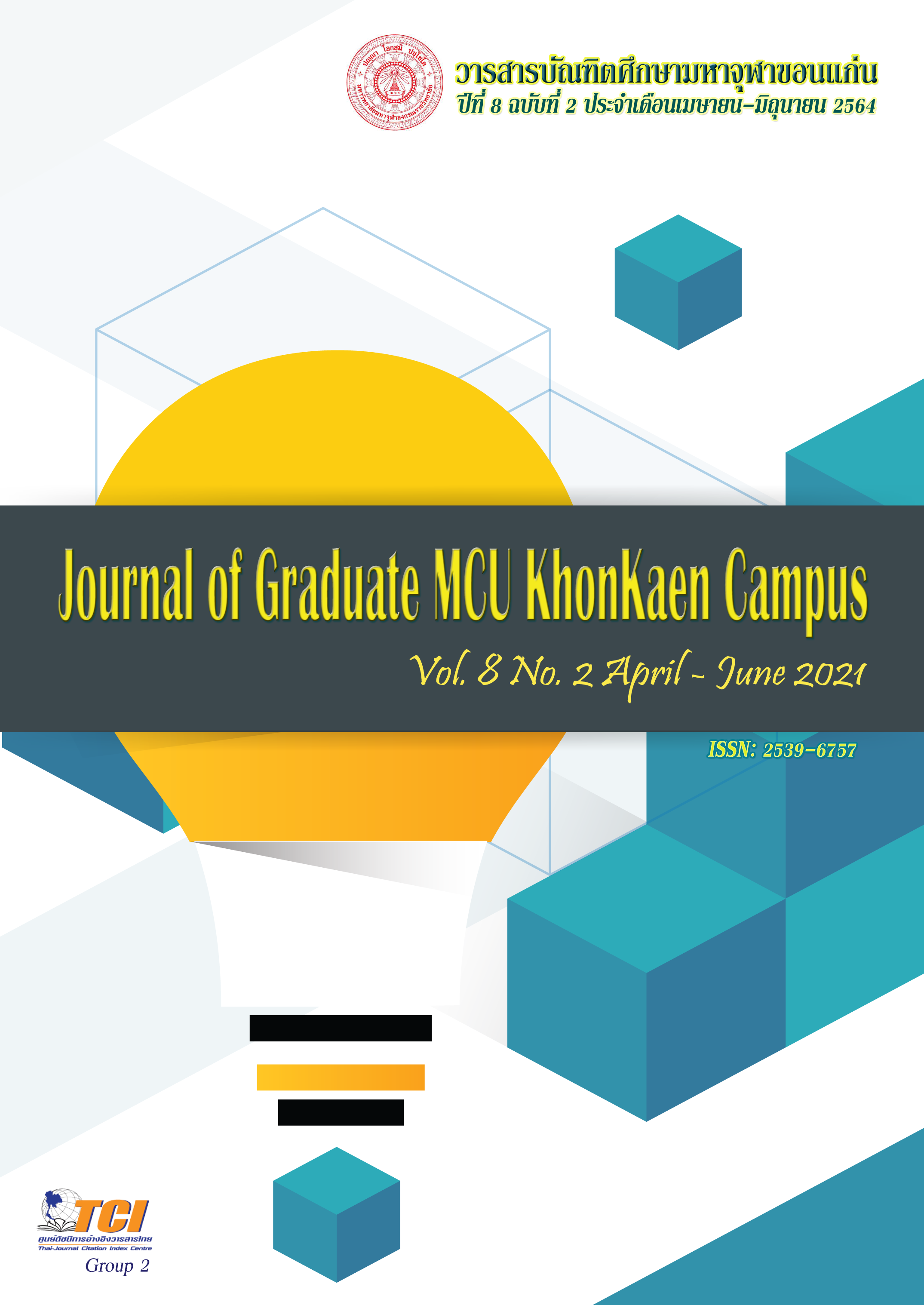PROMOTING OF PUBLIC PARTICIPATION AND CONSCIOUSNESSOF THE PEOPLEIN BUILDING A SOCIETY OF HARMONY RECONCILIATION IN THAI SOCIETY
Main Article Content
Abstract
The objectives of this study are 1) To promote participation 2) To build awareness of the people and 3) Integrating participation and building awareness of the people in building a society of reconciliation of Thai society. It is a qualitative research. Focus on action research by conducting in-depth interviews with selected key informants, 45
photos / person, organized a forum for 21 key informants.
The results of the research were as follows: The religious participation in building a society of reconciliation in Thai society requires the concept of Buddhism as a principle that leads to unity among the group. If everyone has put it into practice Will bring
happiness, peace, and unity to the family, group, community, society and nation.
Participation has organized activities according to the principles as follows: 1) Education activities 2) Religious activities 3) Political activities 4) Justice process activities Creating awareness of the people according to the principle of education depends on people, systems, mechanisms and communication. It is the driving force from the beginning to the achievement of the objectives, as follows: 1) creating awareness, creating awareness on the issues that need to be conscious, 2) identifying value, importance and necessity to realize 3) Encourage thinking 4) Influencing acceptance 5) Inducing it into action 6) Invitation to dissemination 7) Emphasizing continuity in thinking and action 8) Enhancement To make the mind stable and strong Integrating participation and building awareness of the people in building a society of reconciliation of Thai society. Guidelines are presented as follows: 1) Build wealth 2) Decentralize power to communities 3) Support
conservation, promote traditions and culture 4) Learn peace and peace from within P 5) Strengthen unity and unity of the community.
Article Details
References
ม.ร.ว.พฤทธิสาณ ชุมพล, “สันติภาพภายใต้เงื่อนไขของความขัดแย้งทางสังคมและการเมือง”, ใน มนุษย์กับสันติภาพ, (ศรีเพ็ญ ศุภพิทยากุล บรรณาธิการ), (กรุงเทพมหานคร: จุฬาลงกรณ์มหาวิทยาลัย, 2543), หน้า 41.
วิกิพีเดีย, “การปรองดอง”, [ออนไลน์], แหล่งที่มา: https://th.wikipefia.org/wiki [3 กันยายน 2563].
รายงานผลการดำเนินงานของรัฐบาล พลเอก ประยุทธ์ จันทร์โอชา นายกรัฐมนตรี ครบรอบ 1 ปี (12 กันยายน 2557 -12 กันยายน 2558)
แนะนำแนะนำชุมชนคุณธรรมต้นแบบจากพลัง บวร (บ้าน-วัด-โรงเรียน) การพัฒนาที่ยั่งยืนของสังคมไทย กรมการศาสนา กระทรวงวัฒนธรรม
แนะนำชุมชนคุณธรรมต้นแบบจากพลัง บวร (บ้าน-วัด-โรงเรียน) การพัฒนาที่ยั่งยืนของสังคมไทย กรมการศาสนา กระทรวงวัฒนธรรม
จีนา และ รมิตา จีนา. (2560). บวรสันติสุข : รูปแบบการมีส่วนร่วมของบ้าน วัด โรงเรียน ในการส่งเสริมคุณธรรมค่านิยม 12 ประการ จังหวัดเชียงใหม่. วารสารสันติศึกษาปริทรรศน์ มจร, 6(sp1), 47-60.
ทรงศรี ตุ่นทอง และคณะ. (2560). รูปแบบการพัฒนาจิตสานึกสาธารณะสาหรับเยาวชนจังหวัดลพบุรีโดยใช้การปรับพฤติกรรมทางปัญญา. วารสารศึกษาศาสตร์มหาวิทยาลัยบูรพา, 28(2), 65-74.
พระมหากฤษฎา กิตติโสภโณ. (2558). การสร้างความปรองดองสมานฉันท์ด้วยการขับเคลื่อนโครงการหมู่บ้านรักษาศีล 5 จังหวัดพระนครศรีอยุธยา. วารสาร มจร สังคมศาสตร์ปริทรรศน์, 5(3), 55-62.
วุฒิสาร ตันไชย.(2563). การสร้างความปรองดองแห่งชาติ. วารสารสถาบันพระปกเกล้า.10(1), 1-21.
ภาสกร ดอกจันทร์ และรพีพร ธงทอง.(2563). การสร้างความปรองดองของประชาชนในจังหวัดเลย ตามหลักธรรมในคัมภีร์พระพุทธศาสนาเถรวาท เพื่อให้มีการอยู่ร่วมกันอย่างผาสุก. วารสารวิชาการวิทยาลัยบริหารศาสตร์ มหาวิทยาลัยแม่โจ้. 3(1), 87-96

